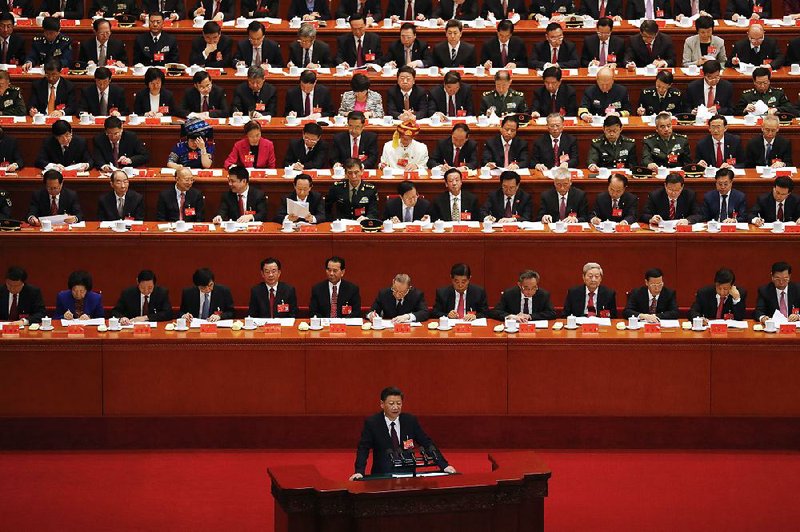BEIJING -- Chinese President Xi Jinping, opening a twice-a-decade national congress Wednesday, urged a reinvigorated Communist Party to take a stronger role in society and economic development to better address the nation's "grim" challenges.
Speaking in the Great Hall of the People near Tiananmen Square, Xi laid out his vision of a ruling party that serves as the vanguard for everything from defending national security to providing moral guidance to ordinary Chinese.
He struck a nationalistic line throughout his speech, calling for the party not only to safeguard China's sovereignty but also to revitalize Chinese culture, oppose "erroneous" ideology and promote religion that is "Chinese in orientation."
"The great rejuvenation of the Chinese nation is no walk in the park or mere drum-beating and gong-clanging. The whole party must be prepared to make ever more difficult and harder efforts," Xi told hundreds of delegates, mostly men in dark suits who applauded regularly as they read copies of his prepared remarks. "To achieve great dreams there must be a great struggle."
Hailing the start of a "new era," Xi outlined a vision in which the party would lead China to become a "great modern socialist country" by midcentury.
Xi wields undisputed power and is expected to get a second five-year term as party leader at the gathering. Analysts say he has consolidated his power by sidelining his competitors in other intraparty cliques, including those surrounding his immediate predecessor, Hu Jintao, and former leader Jiang Zemin.
Observers will be watching for signs of whether Xi, 64, may be looking to appoint a successor. While the nation's presidency is limited to two five-year terms, the tenure of the party's leader is bound only by tradition.
Xi already has distinguished himself from previous leaders and is now "leading China into territory in which China is very close to achieving modest prosperity," said Dali Yang, an expert on Chinese politics at the University of Chicago.
According to Xi's vision, "China would not only be a modern, socialist country but one that stands tall among the nations," Yang said. "This message he delivered with vigor."
The Communist Party meetings will largely be held privately and are accompanied by extraordinary security measures, such as restrictions on knife sales and greater monitoring of dissidents. But the congress will see powerful players emerge in new roles and is a chance for Xi to publicly lay out his political and economic vision over the next five years.
In emphasizing the party's supremacy over all aspects of Chinese society, Xi is "making a big pitch for the importance of party leadership and what he claims only the party can achieve," said Willy Lam, a China expert at the Chinese University of Hong Kong. "It's an appeal to ordinary Chinese to abide by the party's instructions, in particular that of the top leadership -- that is, himself."
Xi, in his 3½-hour address, said China's "prospects are bright but the challenges are grim," an acknowledgement of severe economic problems. He added that the party would have to take big risks and overcome "major resistance."
Other Chinese leaders have regularly warned since the 2008 financial crisis that China's economic growth faces "downward pressure" due to weak global demand that threatens export industries in the world's second-largest economy. But Xi's comments were unusual in a keynote speech meant to highlight the party's confidence and long-range vision.
Among the grave concerns Xi said were insufficiently addressed are a widening income gap and problems in employment, education, medical care and other areas.
He pledged to make high school universally available and promised to extend land-use contracts for farmers for another 30 years after expiration.
Xi hailed China's island-building efforts in the disputed South China Sea, as well as his signature foreign-policy initiative, the "One Belt, One Road" infrastructure investment project aimed at improving connections among China, Europe and Africa.
He also praised the party's tightened grip over domestic security, saying that social stability had been maintained and national security strengthened.
Information for this article was contributed by Christopher Bodeen of The Associated Press.
A Section on 10/19/2017

